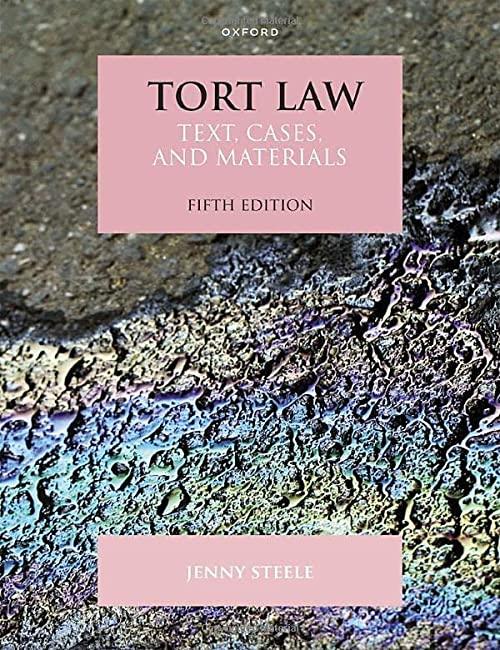Question
1. The __________ is designed to deal directly with cyber-contracts that involve the sale or licensing of digital information. a. Persuasive Precedent Act b. Binding
1. The __________ is designed to deal directly with cyber-contracts that involve the sale or licensing of digital information.
a. Persuasive Precedent Act
b. Binding Precedent Act
c. Uniform Computer Information Transactions Act
d. Uniform State Act
e. Uniform Electronic Transactions Act
2. Which came first in time?
a. The Articles of Confederation
b. U.S. statutory law
c. The U.S. Constitution
d. The Confederate States of America
3. The doctrine of devolution occurs when the courts
a. decide that a federal statute must take precedence over a state statute.
b. shift the obligation to enforce a right from an upper level authority to a lower one.
c. decide that the duty and power to define and enforce rights belongs to the federal government and not the state.
d. decide to transfer the states' regulatory powers to the federal government.
4. __________ attempt to fine-tune the Constitution and update its provisions to meet the demands of a changing socioeconomic structure.
a. The articles
b. The amendments
c. The Bill of Rights
d. Constitutional conventions
5. Individuals who work in concert to undermine an American president and his administration are known as
a. traitors.
b. duckworths.
c. deep state.
d. guerrillas.
e. corporate partners
6. The Uniform Commercial Code is an example of a(n)
a. title.
b. city ordinance.
c. uniform law.
d. executive order.
e. court order
7. A __________ is the basic law of a nation or state.
a. judiciary
b. constitution
c. resolution
d. legislature
8. A precedent that a court is free to follow or ignore is known as a precedent.
a. commanding b. binding c. persuasive d. general
9. If a court determines that the states, rather than the federal government, may determine permissible content on a blog and enforc determinations, they are exercising rights based on
a. the doctrine of devolution b. the principle of supremacy. c. the principle of preemption. d. judicial review
10. Article Ill of the U.S. Constitution authorizes the creation of the federal court system. True or False
11. A court is free to interpret a statute, even if it is not faced with a case involving that statute. True or False
12. A court is free to interpret a statute, even if it is not faced with a case involving that statute. True or False
13. The U.S. Constitution is the supreme law of the land.
True or False
14. All states are required to adopt uniform laws. True or False
15. A ______ is the basic law of a nation or state a. charter b. judiciary c. constitution d. resolution e. legislature
16. A code is a compilation of all of the statutes of________ a.the executive branch b. a particular state only c. court d.the state or federal government e. the federal government only
17. Judicial review refers to the power of the court to hear cases and settle disputes. True or False
18. The concept of relying on previously recorded legal decisions is known as stare decisis True or False
19. The principle of __________means that all other laws must be in line with constitutional principles. a. devolution b. stare decisis c. preemption d. binding precedent constitutional supremacy
Step by Step Solution
There are 3 Steps involved in it
Step: 1

Get Instant Access to Expert-Tailored Solutions
See step-by-step solutions with expert insights and AI powered tools for academic success
Step: 2

Step: 3

Ace Your Homework with AI
Get the answers you need in no time with our AI-driven, step-by-step assistance
Get Started


